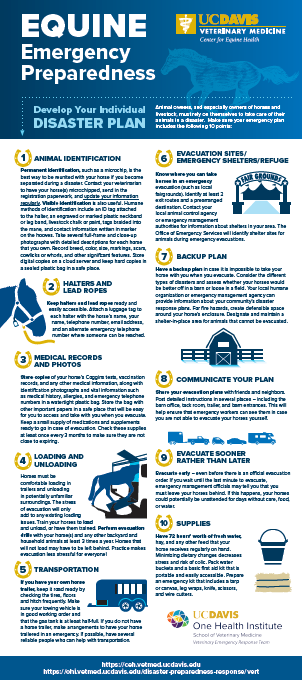10 Things You Might Not Know About Horses and Wildfires
The dramatic increase in wildfire events in the western U.S. in recent years has led to increased awareness about how to keep horses safe from wildfires and how to respond when the two unfortunately mix. However, there are still many ways that we can improve our preparations and responses. We worked with Dr. Lais Costa, MV, PhD, DACVIM-LA, DABVP-Equine, director of operations for the UC Davis Veterinary Emergency Response Team, to highlight some important things you might not know about horses and wildfires.
UC Davis Emergency Preparedness Poster
Download a copy of the UC Davis Equine Emergency Preparedness Poster: https://ceh.vetmed.ucdavis.edu/health-topics/disaster-preparedness

- Early evacuation is the best way to ensure the safety of your horse(s). Keep in mind that it takes longer to evacuate large animals in an emergency, for a variety of reasons. Planning, practice, and patience are key to minimizing stress and maximizing safety for horses and humans alike. Begin implementing your evacuation plan as soon as evacuation orders are indicated for your area (or sooner if possible).
- Plan for more than one evacuation route. Prioritize and practice them. Traffic, emergency vehicles, or the fire itself could block some routes. Take into consideration the type of road, size of your trailer, likely weather and road conditions, and possible detours. Keep maps of the area in your evacuation vehicles in case roads are blocked.
- If you keep your horse(s) at a boarding barn, ensure that barn management has evacuation plans and procedures. Do they have enough trailers to evacuate the number of horses on the premises? Will horses be transported to county evacuation facilities or other barns? Are owners expected to evacuate their own horses in an emergency?
- In emergencies, horses may not behave the way they normally do. Remember that horses are flight and herd animals and these instinct affect their behavior. Stress and confusion can alter their normal ground manners, making them more challenging to handle, load in a trailer, etc. Stay as calm and confident as possible, and allow extra time for loading and transportation (see #1).
- Talk to your veterinarian about sedating your horse(s) during an emergency. Each horse is different. Sedation can be a benefit, but can also be a hindrance. A sedated horse may have difficulty walking, and even sedated horses can react adversely. However, some cases require sedation or tranquilization. Safety of people and horses is paramount. It is best to make sure that horses have practiced loading in different scenarios and by different people.
- Loose horses may try to come back to barns, corrals, etc., even if structures are on fire. Horses will naturally return to familiar places. If you must let horses loose during a wildfire, close barn doors, gates, etc., after setting them loose to keep them from potentially reentering dangerous areas.
- It can be difficult to determine the extent and depth of burn damage in horses. If their feet and head/face are burned, it is very serious. Thermal injury to the feet is life threatening. Burns on the face may compromise their eyes and nasal passages. Another significant threat with burn injuries is infection. Unfortunately, it often takes time to reveal the full extent of burn damage to a horse's health. This can make treatment challenging and frustrating, especially for animals that appear stable. A veterinarian should always examine horses impacted by a wildfire event, even if they appear unscathed.
- Horses that escape wildfires can become sick days after the event, even if they have been medically stable. Monitor horses for conditions such as colic and pneumonia after a fire. Smoke inhalation injury may take 3 to 4 days to become apparent, as their lungs develop severe inflammation and possibly infection. Stress, including changes to environment, diet, routine, and co-mingling with unfamiliar animals can affect digestive and respiratory health.
- Smoke can travel long distances, and poor air quality can affect your horse's health (and your own). Generally, the stronger the wildfire, the higher the smoke reaches into the atmosphere and the farther it can travel. There is currently no available scientific data specifically regarding the impact of various air quality index (AQI) levels on equine respiratory health. The American Lung Association's guidelines have generally been extrapolated for horses.
- Wildlife impacted during a wildfire event can inadvertently end up in the same space(s) as horses. Wildlife-proof fencing may be necessary to keep livestock and horses safe. Avoid interacting with displaced wildlife unless they become threatening to people or other animals. Contact the California Department of Fish and Wildlife if you notice displaced wildlife.
